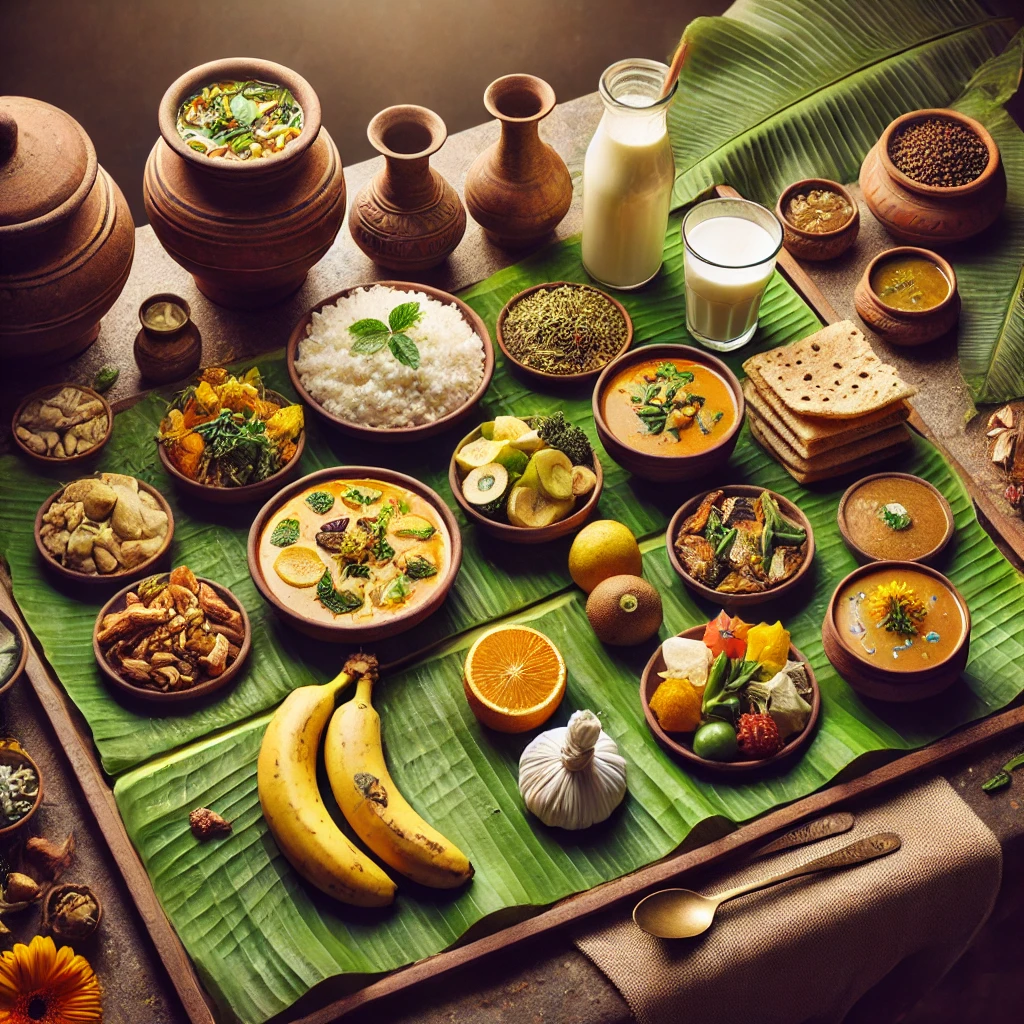vegetarian Shravan food in Varanasi
Finding vegetarian Shravan food in Varanasi, a city brimming with culinary tradition, requires careful navigation. Many establishments offer vegetarian fare, but during the sacred Shravan month, adhering to stricter dietary guidelines is crucial. This guide highlights where to find authentic, Shravan-appropriate vegetarian meals and what ingredients or practices to avoid for a truly pious and satisfying experience.

Authentic Vegetarian Thalis: A Guide to Varanasi’s Best Shravan Offerings
Varanasi, a city steeped in ancient traditions and spiritual significance, witnesses a surge of devout pilgrims during the sacred month of Shravan. This period, characterized by heightened religious observance, also presents a unique culinary landscape, particularly for vegetarian visitors seeking authentic thalis. Navigating this landscape, however, requires careful consideration, as not all establishments adhere to the strictest interpretations of Shravan dietary guidelines. Therefore, understanding where to find truly authentic vegetarian Shravan food, and equally importantly, what to avoid, is crucial for a fulfilling and spiritually enriching experience.
Firstly, it’s essential to understand the core principles of Shravan vegetarianism in Varanasi. Many devotees abstain from onion and garlic during this month, believing these ingredients to be tamasic, or energy-draining. Furthermore, the use of specific spices and cooking methods might also be restricted, depending on individual beliefs and family traditions. Consequently, simply looking for a vegetarian restaurant isn’t sufficient; one must actively seek establishments known for their adherence to Shravan-specific dietary practices.
One reliable approach is to inquire within your accommodation. Many hotels and guesthouses catering to pilgrims often have established relationships with local eateries known for their Shravan-compliant meals. These recommendations are invaluable, as they come from trusted sources familiar with the nuances of local culinary traditions during this sacred month. Moreover, engaging with the local community can yield unexpected rewards. Speaking to shopkeepers, auto-rickshaw drivers, or even fellow pilgrims can lead to the discovery of hidden gems – small, family-run restaurants that may not be widely advertised but offer authentic and delicious Shravan thalis.
However, caution is advised. While many restaurants advertise vegetarian options, not all strictly adhere to Shravan guidelines. Therefore, it’s crucial to directly inquire about the ingredients used in the preparation of the thali. Don’t hesitate to ask specific questions about the presence of onion, garlic, or any other ingredients that might be considered unsuitable during Shravan. A reputable establishment will be happy to provide detailed information about their cooking methods and ingredients, demonstrating their commitment to providing authentic Shravan fare.
In contrast, restaurants that are hesitant to answer your questions or provide vague responses should be approached with skepticism. Similarly, establishments that primarily cater to tourists might not prioritize the strict adherence to Shravan dietary restrictions. Their menus might feature vegetarian options, but these may not necessarily align with the traditional practices observed by many during this period. Therefore, prioritizing smaller, locally-owned restaurants, particularly those frequented by pilgrims, is often a safer bet.
Finally, remember that the experience of finding authentic Shravan food in Varanasi is part of the journey itself. The interactions with locals, the exploration of hidden culinary gems, and the careful consideration of dietary practices all contribute to a richer and more meaningful experience during this sacred month. By combining proactive inquiry with a discerning approach, visitors can discover truly authentic and delicious vegetarian thalis, enhancing their spiritual journey in Varanasi during Shravan.
Navigating Varanasi’s food scene during Shravan, a sacred month for Hindus, presents a unique set of challenges and opportunities for vegetarian travelers. While the city is renowned for its diverse culinary offerings, the observance of strict vegetarianism intensifies during this period, leading to both an abundance of specific dishes and a potential for confusion. Therefore, understanding where to find authentic and appropriate vegetarian food, and equally importantly, what to avoid, is crucial for a smooth and respectful experience.
Firstly, it’s essential to recognize that during Shravan, many establishments adhere to a stricter interpretation of vegetarianism, excluding even onion and garlic from their preparations. This is a significant departure from standard vegetarian fare found elsewhere, and it’s vital to inquire about the ingredients used before ordering. Many smaller, family-run eateries, often located in residential areas away from the main tourist hubs, are more likely to follow these traditional practices. These establishments may not have extensive menus, but their commitment to purity during Shravan ensures a truly authentic experience. Conversely, larger restaurants catering primarily to tourists may offer vegetarian options, but these may not always align with the stricter dietary guidelines observed by many during this month.
Furthermore, the availability of specific ingredients changes during Shravan. Certain fruits and vegetables, considered less auspicious, might be less readily available, leading to variations in the usual menu offerings. This is not necessarily a negative aspect; it presents an opportunity to discover new and seasonal dishes. However, it’s advisable to be flexible and open to trying unfamiliar preparations. Local markets can offer insights into the seasonal produce and provide a glimpse into the culinary adaptations made during this period. Engaging with local vendors can also lead to recommendations for smaller eateries that specialize in Shravan-specific dishes.
In addition to location and ingredient awareness, understanding the cultural context is paramount. Many street food vendors, while offering delicious vegetarian snacks, may not strictly adhere to the Shravan dietary restrictions. While their food might be perfectly safe and palatable, it may not align with the spiritual significance of the month for devout Hindus. Therefore, exercising caution and prioritizing establishments that explicitly advertise their adherence to Shravan guidelines is recommended. Look for signs indicating “Shravan Special” or similar phrases, which often signify a commitment to the stricter dietary practices.
Finally, communication is key. While English is spoken in many tourist areas, learning a few basic Hindi phrases related to food and ingredients can significantly enhance your experience. Asking about the ingredients (“is mein pyaaz hai?” – does it contain onions?) or clarifying the preparation method can prevent any unintentional dietary transgressions. Don’t hesitate to ask locals for recommendations; their insights into the local food scene, particularly during Shravan, are invaluable. By combining careful observation, proactive inquiry, and a willingness to embrace the local culinary traditions, one can navigate Varanasi’s food scene during Shravan with ease and respect, enjoying a truly authentic and enriching vegetarian experience.
Shravan in Varanasi: Finding Delicious and Sacred Vegetarian Food
Shravan, the sacred month in the Hindu calendar, holds immense significance in Varanasi, a city deeply rooted in religious tradition. During this time, the city pulsates with spiritual energy, and a significant aspect of this experience is the abundance of vegetarian food available. However, navigating the culinary landscape of Varanasi during Shravan requires careful consideration, as the sheer volume of options can be overwhelming, and not all establishments adhere to the strictest interpretations of vegetarianism. Therefore, understanding where to find truly vegetarian food, and what to avoid, is crucial for a fulfilling and spiritually enriching experience.
Firstly, it’s important to understand the nuances of vegetarianism within the context of Hindu dietary practices. While many restaurants advertise vegetarian fare, some may use ghee (clarified butter) or other ingredients that might not align with the stricter interpretations followed by many during Shravan. Consequently, seeking out establishments specifically catering to Jain or Brahmin communities is often a safer bet. These communities have historically maintained the most stringent vegetarian practices, ensuring the complete absence of any non-vegetarian ingredients or byproducts. Look for restaurants prominently displaying signs indicating their adherence to these dietary restrictions. Often, these establishments will also clearly label dishes containing ingredients like onions or garlic, which some devotees avoid during Shravan.
Furthermore, the smaller, family-run eateries tucked away in the labyrinthine lanes of Varanasi often offer a more authentic and reliable vegetarian experience. These establishments, frequently located near temples or ghats, are often run by individuals deeply committed to their faith and therefore meticulously adhere to the dietary guidelines of Shravan. While they might not have extensive menus, the food is typically fresh, locally sourced, and prepared with utmost care. Engaging with the local community and asking for recommendations can lead to discovering these hidden culinary gems. Don’t hesitate to inquire about the ingredients used in a particular dish; the owners are usually happy to explain the preparation process, further assuring you of its vegetarian nature.
Conversely, larger, more tourist-oriented restaurants, while offering a wider variety of dishes, may not always maintain the same level of strict vegetarian practices. While many will offer vegetarian options, the risk of cross-contamination or the use of non-vegetarian ingredients in some dishes is higher. Therefore, exercising caution and carefully scrutinizing the menu is essential. If unsure, it’s always advisable to politely inquire about the preparation methods and ingredients used, clarifying any potential concerns. Transparency should be expected from any reputable establishment.
In conclusion, finding delicious and sacred vegetarian food in Varanasi during Shravan is achievable with a little research and awareness. Prioritizing smaller, family-run establishments, particularly those catering to Jain or Brahmin communities, significantly increases the chances of finding authentic and strictly vegetarian meals. Remember to engage with the local community, ask questions, and be mindful of the potential for cross-contamination in larger restaurants. By approaching your culinary exploration with careful consideration, you can ensure a spiritually enriching and gastronomically satisfying experience during this sacred month in Varanasi.
Q&A
Q1: Where can I find vegetarian Shravan food in Varanasi?
Many small eateries and restaurants throughout Varanasi offer vegetarian food, especially during Shravan. Look for places advertising “Shravan special” or “Satvik Bhojan.” Larger hotels often have vegetarian options, but may not specifically advertise Shravan menus. Street food should be avoided during Shravan.
Q2: What specific dishes are typically available during Shravan in Varanasi?
Expect to find simple, sattvic dishes like kheer, fruits, vegetable curries (avoiding onions and garlic), various types of roti and rice, and milk-based sweets.
Q3: What should I avoid eating during Shravan in Varanasi?
Avoid non-vegetarian food, dishes containing onions and garlic, and street food due to hygiene concerns. Also be cautious of restaurants that don’t appear clean or hygienic.
Conclusion
Finding vegetarian Shravan food in Varanasi during the holy month presents few challenges, as most establishments already offer largely vegetarian menus. However, to ensure adherence to strict Shravan dietary restrictions, prioritize smaller, family-run eateries over large restaurants. Avoid establishments that explicitly serve non-vegetarian food or those that may use shared cooking utensils for both vegetarian and non-vegetarian dishes. Look for places emphasizing “Shravan special” menus or those clearly indicating the use of pure ghee and avoidance of onion and garlic. Confirm ingredients directly with the vendor if unsure.





